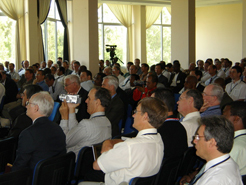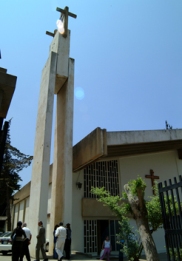"Our future is what beckons us and challenges us. And we must walk into that future without distancing ourselves from the 'wall' at our backs. We must feel its support constantly," Seventh-day Adventist world church president Pastor Jan Paulsen said during a July 8 message at a gathering of 240 Adventist theologians and scholars in Izmir, Turkey.
He spoke on the second day of the 10-day 2nd International Bible Conference on the role of theology in the modern church. The conference takes place at a resort near the Aegean Sea, not far from where the Apostle Paul preached to Jesus' followers 2000 years earlier.
"The only life we have to live is that which lies ahead," Paulsen continued. "All of the policies we adopt, all of the adjustments we make to structures, [the] Church Manual and [the] Fundamental Beliefs are made with an eye to the future."
"We're here to learn from each other," said Dr. Angel Manuel Rodríguez, director of the church's Biblical Research Institute, in remarks opening the event on July 7. He said the group was also there to "reaffirm our commitment to the mission of the Adventist Church," with lectures that "aim at the practical dimension."
The event is meeting under the theme, "The Nature, Mission and the Unity of the Seventh-day Adventist Church," and is sponsored by the Biblical Research Institute, the Adventist Theological Society, and the Horn Archeological Institute at Andrews University, at Berrien Springs, Michigan.
Along with 12 plenary sessions, there will be more than 100 specialized presentations in study groups on a variety of Biblical topics ranging from a discussion on the "Rabbinic Exegesis of Deuteronomy 24:1 and Adventist Hermeneutics" to "Sanctuary and the Character of God" to "The Seventh-day Adventist Theologian and Ordination," as well as topics relating to Adventist ecclesiology.
The presenters come from seminaries in Europe, Africa, Asia, Central and South America, as well as the United States. The event will also take the participants to the seven churches identified in the Book of Revelation (chapters 2 and 3), ancient Troy and the island of Patmos.
"We are here in one of the most important eras in world history and the history of the church," said Pastor Ulrich Frikart, president of the church's Euro-Africa region, which includes Turkey. "We are here on prophetic ground."
Visits to key places in early Christianity during the conference will bring attendees face to face with traditions but, Pastor Paulsen said that while we appreciate, and lean upon, the "wall" of tradition, teachings and policies the church has built up, our focus must be on what he called "the openness which lies before us," and not on the past.
Carrying forward the theme of unity--and the challenges that unity faces--he noted several "forces which impact and shape us" as a movement, including Adventism's "own rapid growth." Such growth means the Adventist church is "becoming more localized--and thereby more decentralized with respect to how you manage and serve the church."
Paulsen added, "Rapid growth [and] expansion, numerically and territorially, means that the kind of control and guidance which in the past may have come from one central headquarters ... is not sustainable or effective. There may be 'technical' reasons or political reasons or reasons of government regulations which severely limit the extent of involvement which may come from an international headquarters in another part of the world."
He added that contextualization is another shaping force: "None of us is asked to step out of our culture to become Adventists. Our culture and our history is where we live and have our experiences, and, therefore, cannot or should not be stepped out of or shed."
Paulsen noted a "younger, newer, quite conservative Seventh-day Adventist Church is what lies immediately before us, if we think of it as a whole," calling the demographic trend a third "shaping force" for the movement. The challenge will come in resolving the "inevitable tension" between this globally "southern" Christianity, and its globally "northern" counterpart, which he said "is increasingly impacted by secularism, 'spiritual relativism,' modernism and a range of other 'isms.'"
An additional shaping force will be globalization, Paulsen said.
"While it is true that the church is becoming increasingly more local and decentralized, there is an opposite force at work," he said. "The 'flatness' of the world means a rapid spread of ideas, experiences and expectations."
He said this globalization has also spawned ethnic congregations who want "a voice and [have] a fair presence in the life and decisions of the church network in which they are now located, although a long ways away from their traditional home."
Responding to these challenges, Paulsen listed nine "markers or boundaries" that can lead the church safely into the future. The first is scripture itself: "there are hazardous ditches on either side of the road," he said. "Adrift from Scripture you will surely land in one of them."
Further, Paulsen said, "Jesus Christ must be the unequivocally identified and acknowledged guide into the future. ... Any 'brand' of Seventh-day Adventist that does not have Jesus Christ at its center, recognizable and affirmed, should not be allowed space within our community."
Other guides include a willingness to continue to make spiritual discoveries, while maintaining "an equally clear stance which refuses to compromise Scriptural values." The church must also maintain a mission focus for all of its activities, Paulsen added.
He also said that "our engagement in the plight of the poor, the ill, the refugees and those disenfranchised for other reasons must be a clearly visible value on our agenda for mission." Inclusion of ethnic and gender diversity in the work of the church must also be emphasized, Paulsen said. [Editor: Mark A. Kellner for ANN/APD]


